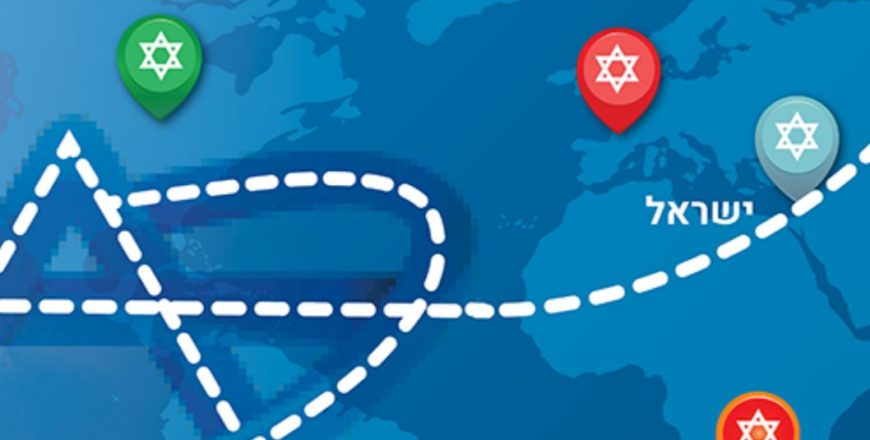
Painting a Mural of Information: Insights from the Government of Israel, Ministry of Diaspora Affairs
The Government of Israel, Ministry of Diaspora Affairs engages Rosov Consulting to evaluate the impact and outcomes of their many investments and programs in the diaspora. To share the nature of this work with others—and to highlight some of the dynamics of such a cross-portfolio endeavor—we sat down recently for a Q&A with Hagay Elitzur, Deputy Director General of the Government of Israel, Ministry of Diaspora Affairs. We hope you enjoy his insights and learnings.
What is your role and responsibility with Israel’s Ministry of Diaspora Affairs?
As Deputy Director General, I engage with Jewish communities around the world. We really address three main areas:
- Our community and education projects are designed to help strengthen people’s Jewish identity and connection to Israel, and their sense of meaning and belonging in their local Jewish communities.
- We support and build the resilience of communities, especially now to combat antisemitism.
- In Israel, we work to increase the commitment to and feelings of mutual responsibility of Israelis toward Jewish communities around the world.
All of these efforts are conducted in partnership with communities, organizations, and philanthropies in the Diaspora. Together, we invest in and implement partnerships and projects in these three areas.
What did you want to learn from evaluation of your various programs?
From the beginning, we knew that we needed to have research to help us understand the impact of all of our investments around the world. We also wanted to compare some of the different projects that address different areas. If some projects affect people more deeply than other projects, we need to know that and act accordingly—what to keep and what to change. And we felt it was important that this research be done by an independent firm. As the research accumulates, we begin to have a mural of sorts that paints a rich picture of our impact.
With so many projects all over the world, how did you know where to start when it came to researching them?
Certainly we needed to prioritize which projects we wanted to learn about first; it would have been impossible to research all of them at the same time. We leaned on Rosov Consulting to determine both which projects made sense to examine first, and exactly how to go about the research.
What do you hope comes out of these research efforts?
Well, it would be incredibly beneficial if the Jewish people have standards and benchmarks for how we measure programs. Then we could really compare different programs and understand which ones work best depending on an organization’s desired goals. For example, if someone wants to create a program that strengthens Jewish identity of participants, or increases social connections, or deepens educational experiences, this research will show how to design for each of those desired outcomes.
What are some of the specific learnings you’ve seen in the research?
We were very pleased to see the results of the Mosaic United college engagement project, conducted in partnership with Chabad, Hillel and Olami. Their efforts are empowering Jewish emergent adults to develop deeper connections to their Jewish heritage and identities and forge a bond with Israel on their own terms and in their own time. The results show that the participant outcomes from Mosaic can be equivalent to participating in a long-term immersive program in Israel. That’s a very helpful learning for us—it informs how we approach our continued investment in Mosaic. In addition, we’re excited how the data gathered—shared fully with the partners—is able to inform their decision-making. The data is making a formative contribution to their work.
Another learning relates to the Unit.Ed program, which supports Jewish day schools in the Diaspora and helps to deepen their Jewish and Israel education opportunities. We learned that the attention to and investment in Jewish day schools is important not just for any outcomes that result, but to the teachers themselves. They appreciate the help and support; the fact is that teachers aren’t always appreciated. This research shows that they really like knowing investments are being made in their day schools. For us, it affirms that educators are on the front lines and warrant investment both for the tangible outcomes and for what those investments signal to the educators.
What are some of the challenges you experience with this work?
There are a few that come to mind:
- The culture of research within organizations is not always developed to the same degree. For some, evaluation seems threatening. Organizations can be concerned that their funding may stop if the research doesn’t convey certain results. Rosov Consulting really helps to develop the trust of organizations to buy in to the research and to understand how it can help their organizations grow and run the best programs possible.
- Terms like “Jewish culture” and “campus” mean different things all over the world. So even if you think you’re being clear about comparing two seemingly similar programs in different Diaspora communities, that’s actually not always the case. This challenge really shows how important it is for us to create culturally sensitive benchmarks that are coherent across different contexts.
- We still need to continually refine the tools for how to measure what we want to measure. This is a global effort and really never stops. We’re interested in developing tools that can help us and Jewish organizations worldwide gather information that will be most useful moving forward, for everyone in the Jewish world to use. This is a task that will never be complete. To truly be useful, those tools need to be continually revised as the circumstances change.
Learn more about the work of the Ministry of Diaspora Affairs.




